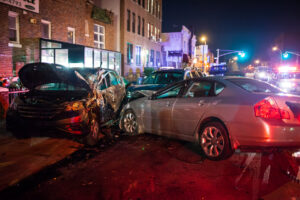Comparative Fault

In a textbook personal injury accident, one party is 100% at fault, while the other party shares absolutely none of the blame. It gets a lot more complicated in real life, however. Two or more parties might share liability.
Different states use different systems of apportioning liability. One of the most common uses of contributory fault is in motor vehicle accident claims, such as car accidents, truck accidents, and motorcycle accidents. Other types of personal injury claims may apply the concept as well.
Contributory Negligence

Contributory negligence is a harsh doctrine that only a few jurisdictions follow–Alabama, Maryland, North Carolina, Washington, DC (sometimes), and Virginia. Under contributory negligence, there is no sharing of liability. If you suffer a personal injury, you lose your right to claim any compensation at all if you were even one percent at fault.
On the bright side, you can be 99% at fault and still get away with paying nothing. No matter what else you do, be particularly careful if you are driving in one of these states.
Pure Comparative Negligence
Pure comparative negligence is a relatively recent legal innovation. It is the polar opposite of contributory negligence. Louisiana, for example, is a pure comparative negligence state. All told, a dozen states follow pure comparative negligence.
Under pure comparative negligence, you can receive a portion of your damages even if you were mostly at fault. If you were 99% at fault, for example, you can still receive 1% of your damages. If you were 1% at fault, you can receive 99% of your damages.
Modified Comparative Negligence With a 50% or 51% Bar
Modified comparative negligence is a compromise between the harshness of the contributory negligence system and the free-for-all (some assert) of pure comparative negligence.
Under modified comparative negligence, you would be barred from receiving compensation if your percentage of fault reaches either 50% or 51%, depending on the law of the particular state. Otherwise, these systems are just like pure comparative negligence.
Slight/Gross Negligence
South Dakota is the one state that applies a unique system called “slight/gross negligence.” This system is like the contributory negligence system explained above, but it is slightly more humane.
Under this system, you can receive damages even if you were slightly negligent, as long as the other driver’s behavior constitutes “gross” negligence.
A Baton Rouge Personal Injury Lawyer Can Help You Sort It Out
You don’t need to worry if you cannot afford to pay a lawyer by the “billable hour.” Personal injury lawyers don’t work that way. Instead, they offer free initial consultations, no upfront fees, and no legal fees at all unless they win your case, either in court or at the settlement table.
If they win, your legal fees will amount to a pre-agreed percentage of whatever amount you win. This is known as the contingency fee system.
Contact our Palmintier Law Group attorneys by calling 225-401-6962 for a free consultation to discuss your car crash and how we can help you pursue compensation for your injuries.
